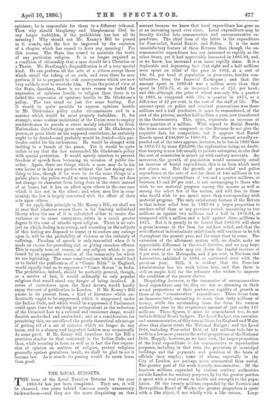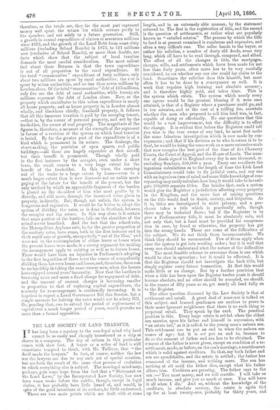THE LOCAL BUDGETS.
THE issue of the Local Taxation Returns for the year 1883-84 has just been completed. They are, it will be observed, two years behind time—a surely unnecessary backwardness—and they are the more disquieting on that
account because we know that local expenditure has gone on at an increasing speed ever since. Local expenditure may be broadly divided into remunerative and unremunerative ex- penditure. The chief item of the latter is the expenditure for Poor-relief, Burial Boards, and Police. It is the most unsatisfactory feature of these Returns that, though the un- remunerative expenditure has not increased so rapidly as the other items, yet it had appreciably increased in 1883-84, and, as we know, has increased even more rapidly since. It is a deplorable and depressing fact that eight and a half millions were spent on relief of the poor in 1884, at a cost of 10s. 8d. per head of population in poor-rates, besides con- tributions from the Imperial Exchequer ; and that the amount spent in 1883-84 was a million more than that spent in 1874-75, at an increased rate of 21-d. per head ; and this although the price of wheat was only 40s. a quarter in 1884, as compared with 51s. a quarter in 1875, or a difference of 22 per cent. in the cost of the staff of life. The amount spent on police and criminal prosecutions was three millions and a half (exclusive, it must be remembered, of the cost of the prisons, another half-million a year, now transferred to the Government). This, again, represents an increase of three-quarters of a million. With regard to Burial Boards, the items cannot be compared, as the Returns do not give the requisite data for comparison, but it appears that Burial Boards spent £400,000 in 1883-84. The amount actually ex- pended out of the rates appears, however, to be less in 1883 than. in 1872-73 by some £20,000, the explanation being, no doubt, that burying is now left usually to private enterprise, or else that the cost of cemeteries is mixed up with sanitary accounts. As, moreover, the growth of population would necessarily entail an increase of burial expenditure, this is an item which need not alarm us. But the growth of poor-relief and police expenditure at the rate of not far short of two millions in ten years, on a total expenditure of ten and a quarter millions, or between 15 and 20 per cent., is not encouraging to those who wish to see material progress among the masses as well as among the select few of the nation, and still less to those who would wish to see moral more than corresponding with material progress. The only satisfactory feature of the Return is that indoor relief bore in 1883-84 a larger proportion to outdoor relief than at any previous period, amounting to two millions as against two millions and a half in 18t-3-84, as compared with a million and a half against three millions in 1875. But it is greatly to be feared that 1885-86 will show a great increase in the item for outdoor relief, and that the evil effects of indiscriminate relief-funds will continue to be felt V.-..roughout the present year, and for some time to come. The extension of the allotment system will, no doubt, make an appreciable difference in the rural districts, and we may hope that a revival of trade may cut down the fearful increase of 6 per cent, in the Metropolis, and 2 per cent. in Durham and Lancashire, exhibited in 1884, as contrasted even with the previous year. Still, it is evident that the Poor-law administrator has his work before him, and that there is still an ample field for the reformer who wishes to improve the condition of the poorer classes.
Disquieting, however, as the summaries of unremunerative local expenditure may be, they are not so alarming in their actual proportions or their portentous rapidity of growth as those of the " remunerative " expenditure. These items form an immense total, amounting to more than forty millions of money, while the outstanding loans due from the various authorities rose to the stupendous amount of just under 115 millions. These figures, it must be remembered too, do not include School Board budgets. The Local Budget, remunerative and unremunerative, of fifty-two millions forEngland and Wales alone thus almost rivals the National Budget ; and the Local Debt, including Poor-relief Debt, of 121 millions bids fair to swell in a few more years to the awful proportions of the National Debt. Happily, however, as we have seen, the larger proportion of the local expenditure is for remunerative or reproductive purposes, including in that term the provisions of municipal buildings and the pyments and pensions of the hosts of officials they employ, some of whom, especially in the City of London, are perhaps inore ornamental than useful. The greater part of the work is really remunerative. Of the fourteen millions expended by various sanitary authorities outside London for sanitary purposes, by far the greater portion is spent with a real return in health and strength to the popu- lation. Of the twenty millions expended by the Vestries and Metropolitan Board of Works, the greater proportion is spent with a like object, if not wholly with a like return. Large therefore, as the totals are, they for the most part represent money well spent, the return for which accrues partly to the spenders, and not solely to a future generation. Still, a growth in annual expenditure of sixteen or seventeen millions since 1873, and the growth of the Local Debt from some sixty millions (including School Boards) in 1873, to 121 millions now (exclusive of School Boards), or more than double, are facts which show that the subject of local taxation demands the most careful consideration. The most salient fact about these Returns is that the town expenditure is out of all proportion to the rural expenditure. Of the total " remunerative " expenditure of forty millions, only about two millions are spent by rural authorities; the rest is spent by urban authorities, and no less than seven millions by London alone. Of the total "remunerative" debt of 115 millions, only five are the debt of rural authorities, while twenty-six millions represent the debt of London alone. Now, as the property which contributes to this urban expenditure is nearly all house property, and as house property is, in London almost wholly, and elsewhere chiefly, leasehold property, it follows that all this immense taxation is paid by the occuping tenant, —that is, by the owner of personal property, and not by the freeholder, the owner of real property. The magnitude of the figures is, therefore, a measure of the strength of the argument in favour of a revision of the system on which local taxation is levied. By far the greater part of the expenditure is of a kind which is permanent in its nature. The drainage, the street-making, the provision of open spaces, and public buildings,—all these are hugely expensive at first set-off, but their benefit is permanent. Though wholly paid in the first instance by the occupier, even under a short lease, the result enures to a very large extent for the benefit of the freeholder. In this view, the carrying out of the works to a large extent by loans—even to a much larger extent than is now done—is not an unfair mort- gaging of the future for the benefit of the present, but the only method by which an appreciable fragment of the burden is placed on the shoulders of him who most profits by it directly, and still more, through the increased value given to property, indirectly. But, though not unfair, the system is dangerous and expensive. It would be far better to adopt the system of dividing the rates, as is done in Scotland, between the occupier and the owner. In this way alone is it certain that some portion of the burthen falls on the shoulders of the actual owner benefited: And the fact that the school-rate, the Metropolitan Asylums rate, by far the greater proportion of the sanitary rates, have come, both in the first instance and in their rapid rate of growth, unexpectedly " out of the blue," and were not in the contemplation of either lessor or lessee when the present leases were made, is a strong argument for making the arrangement apply to existing as well as to future leases. There would have been no injustice in Parliament's adopting in the first imposition of these rates the course of compulsorily dividing them between lessor and lessee, and, therefore, there can be no hardship in taking the same course now, when the lessors have enjoyed several years' immunity. Now that the burthen is becoming more and more a fixed charge for repayment of debt, and the amount of current charges is becoming smaller in proportion to that of replacing capital expenditure, the necessity for re-arrangement is continually increasing. It is hopeless to expect a Local Government Bill this Session, but a simple measure for halving the rates would not be a long Bill. Or, pending that, one to extend the period of replacement of capital over a much longer period of years, would provoke no more than a formal opposition.



































 Previous page
Previous page